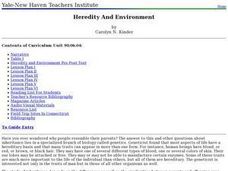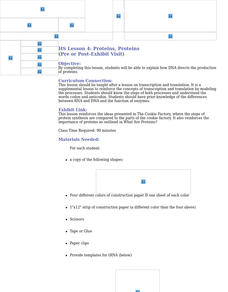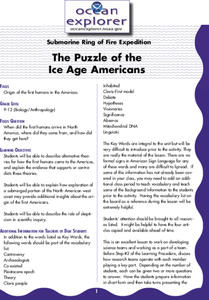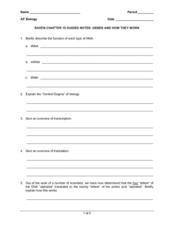Curated OER
Cell Cycle, Mitosis and Meiosis
Seventh graders describe the processes involved in mitosis and meiosis. In this life science lesson, 7th graders create chromosome models using strings and beads. They play a jeopardy team game at the end of the unit to review concepts...
Virginia Department of Education
Genetic Variation and Mutations
Young scientists demonstrate their creativity while completing several activities, to assess genetic variations and mutations. Instructors provide a list of options and scientists choose to write a comic strip, create a book, construct a...
LABScI
Taxonomy: Who is in My family?
Find similarities in seemingly unlike organisms. The second instructional activity in a series of 12 builds the concept of a taxonomy and explores the use of a dichotomous key. Learners begin in part one by attempting to group a set of...
Biology Junction
Cellular Structure
The human body contains more than 200 types of cells, and plants contain many other unique types of cells. While a huge variety of cells exist, they appear to have very similar structures. A detailed presentation describes the structure...
Curated OER
Creative Ways To Teach Evolutionary Concepts
Students explore evolutionary concepts in cartoons and lab activities. They describe and explain evolutionary concepts featured in a cartoon and participate in laboratory activities.
Curated OER
From Genomes of Species
High schoolers investigate genomic research being done and its potential for understanding, treating, and possibly curing human genetic conditions. The potential of proteomic research as a companion to the work being done with genomics...
Curated OER
Heredity And Environment
Students complete a pre-test on the relationship between heredity and the environment. As a class, they write down descriptions of themselves and identify which traits can be changed and not changed. In groups, they determine which genes...
Curated OER
Born of Blood: Inheritance of Blood Types
Students examine inheritance of blood types. In the chromosome lesson, students create a model of chromosome and predict the blood type of offspring.
Curated OER
Gene Regulation Mechanisms
Young scholars explore the control of expression of DNA into proteins which is divided into two main categories: transcriptional and post-transcriptional. They construct examples of the control mechanisms and discuss disease processes...
Curated OER
Nucleic Acids and Protein Synthesis
Young scholars cut out the nucleotide models and have an opportunity to relax and chat. Using imagination, students pretend to be molecules acting out protein synthesis and whole body movement.
Curated OER
Cracking the Code - Cloning Paper Plasmid
Students explore the "genetic code." They observe how genes may be manipulated for genetic research, gene cloning, and genetic engineering. In a lab setting, students examine the mechanics involved in cutting and ligating DNAs into a...
Curated OER
Genome: The Secret of How Life Works
Students explain how DNA directs the production of proteins.
Curated OER
Chromosomes and Genetic Mapping
Learners create models of chromosomes using clay, coins, beads, or marbles. They complete a worksheet regarding their crossover frequencies they created with their chromosomes and gene models. They read an essay on sex chromosomes and...
Curated OER
Megabeasts
In this biology worksheet, students use their mathematical skills to create a three dimensional scale model of an ancient insect. They draw a diagram of their insect and label it with as much information as possible.
Curated OER
X or Y- Does it Make a Difference?
Students examine the X and Y chromosomes. In this research lesson, students use the 5E lesson model as they read articles about human chromosomes then discuss their findings and opinions.
Curated OER
The Puzzle of the Ice Age Americans
Students describe alternative theories for how the first humans came to the Americas, and explain evidence that supports or contradicts these theories. They examine the role of skepticism in scientific inquiries.
Curated OER
Transformation of E. coli with Antibiotic Resistance
Pupils participate in an experiment in which they transform an E. coli cell. They discover how the genetic make-up of the cell can be changed by added foreign DNA. They answer questions to complete the lab.
Curated OER
Ethical Decision Making in Biology
Students explore a model that illustrates the spread of HIV through an adolescent population. Acting in the role of epidemiologists, students explore the dilemmas of HIV infection presented by a simulation. Students produce a play, skit,...
Curated OER
Cells and Cancer
Students idenitfy that cancer is a growth of mutated cells and that cancer cells are only one type of cell that causes disease in our body. They also identify that all eukaryotic cells contain a nucleus, cytoskeleton, and a cell...
Curated OER
Antisense Oligonucleotide Therapy
Students conduct Internet research on Antisense Oligonucleotide Therapy. They design a puzzle to represent these processes, read and summarize an article, conduct research, and design a theoretical experimental procedure.
Serendip
The Molecular Biology of Mutations and Muscular Dystrophy
Different types of mutations cause unique types and degrees of muscular dystrophy. Scholars learn about the types of mutations and the impact on the body. They compare the location of the mutations and draw conclusions about how it is...
Curated OER
Raven Chapter 15 Guided Notes: Genes and How They Work
What does it take to produce all of the proteins that make up a living organism? An amazing series of events! Biology novices review the steps of protein synthesis by breaking down transcription and translation in detail. Colorful...
Curated OER
Biotechnology Laboratory Research
Young scholars participate in an extended laboratory research to experience how scientific information is obtained, upon which we build scientific knowledge and understanding.
Howard Hughes Medical Institute
Virus Explorer
Most pupils know about the flu, HIV, and other viruses, but they don't know what each actually looks like. This interactive shows their relative size, structure, and allows for comparisons. It stresses the similarities and differences...
Other popular searches
- Building Dna Models
- Edible Dna Models
- Dna Models / Worksheets
- Paper Dna Models
- Dna Models With Gumdrops
- Dna Models Science Box
- Dna Models Unzip
- Origami Dna Models
- Dna Models \/ Worksheets

























